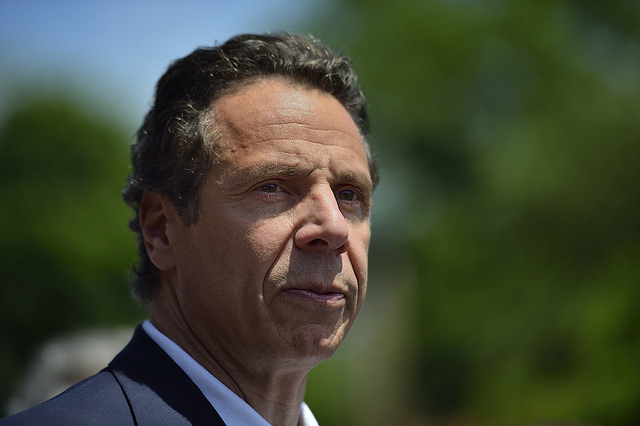 Andrew Cuomo. Image: Diana Robinson
Andrew Cuomo. Image: Diana Robinson
Andrew Cuomo, today being re-elected Governor of New York, is admired, feared, respected, hated. In his recent book, All Things Possible, Cuomo writes:
At the end of your career, the only thing that matters is the lasting effect of your actions. Otherwise, what’s the point? You have to be willing to incur opposition if you actually want to get something meaningful done. All the difficult issues are controversial, by definition. But that’s the point of public service and what separates the statesmen from the journeymen in my opinion.
There is no reason to believe this is just idle rhetoric from a future presidential candidate. Coming in the context of eulogizing the political career of a Westchester County executive who helped him early in his career, this statement both reflects and attempts to justify Cuomo’s well-known ruthlessness. And hey, what’s wrong with being ruthless when it’s the only way to get the job done (especially in Albany)? “Be realistic—you can’t please everyone on your way to getting shit done.” That seems to be the motif of All Things Possible and the motto that drives Cuomo’s career.
Cuomo writes that he saw himself as the “radical reformer” candidate for governor in 2002, when he lost the Democratic nomination to Carl McCall. It is hard to imagine Cuomo sees himself that way now. He certainly doesn’t brand himself as such, preferring the now-popular “fiscal conservative, social progressive” hybrid.
Cuomo has shown distaste for self-labeled “progressives” and those feelings are mutual. His relationship with Mayor Bill de Blasio—who was elected as the anti-Bloomberg and has been hammering on the theme of equity since taking office—has been uneasy since de Blasio took office this January. Many elected officials, even state-level Democrats, have voiced their animosity toward the governor.
But hey, he gets shit done! (Did you hear the budget passed on time again?)
Yet in his re-election campaign—even after reports of the Moreland Commission farce and his support for Republican control of the state senate—he claimed the endorsement of the Working Families Party, a progressive holy grail, and the New York Times. The Times endorsement is understandable: Cuomo is the only serious candidate for governor who is not crazy. But Cuomo’s capture of the WFP nomination and his subsequent support of the Women’s Equality Party to suck votes from the WFP are a perfect snapshot of his political mastery.
This year, Cuomo swatted aside a far-left Democratic primary challenge from Zephyr Teachout. He faces far different hurdles on the national stage. He makes no secret of his ties to the Clintons, which makes a Hillary campaign a very tricky proposition for him. Then there is Elizabeth Warren, progressive hero. (All three have published bland books this year.) They stand in addition to Maryland Governor Martin O’Malley, whose tenure has paralleled Cuomo’s: the two have essentially raced to sign bills on marriage equality, crime, and immigration reform.
It is admirable to stick to one’s guns and refuse to do the bidding of a political machine. The essence of Cuomo is that politics is a game with winners and losers, and that every other person in the arena is a potential roadblock to his goals. This is his chosen method of doing business—a gamble that there are enough people who agree with his positions on individual policies to support him. “It doesn’t do any good to have [political capital] if you don’t use it,” he writes.
The end result is some legitimately progressive legislation along with the alienation of many constituents and would-be supporters. New Yorkers will be choosing another term of Cuomo as governor today, but will have to wait to see how his game plan works nationally.
 Neil Reilly is a TBQ Blog Editor. He works as a policy analyst at Citizens Housing & Planning Council, and writes on data and urban social policy matters.
Neil Reilly is a TBQ Blog Editor. He works as a policy analyst at Citizens Housing & Planning Council, and writes on data and urban social policy matters.

2 thoughts on “Andrew Cuomo and the Estranged Left”